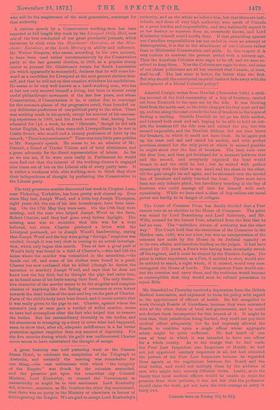The Court of Common Pleas has finally decided that a
Peer cannot vote at an election to the House of Commons. The point was raised by Lord Beauchamp and Lord Salisbury, and Mr. Wills, counsel for the former Peer, admitted from the first that he had no case. The "unbroken stream of authority was the other way." The Court held that the resolution of the Commons in the Malden case, 1669, was not a law, but was an interpretation of the common law made by the House in its Judioial capacity as to its own affairs, and therefore binding on the judges. It had been obeyed for 170 years, a Peer's vote having been invariably struck off the register, and it must be obeyed by the Election Judges. The point is rather important, as a Peer, if entitled to elect, would also be entitled to stand, a right which, if it existed, would very soon extinguish the House of Lords. The competent Peers would con- test the counties and carry them, and the residuum would become so contemptible that they would soon be refused permission to reject Bills.


































 Previous page
Previous page